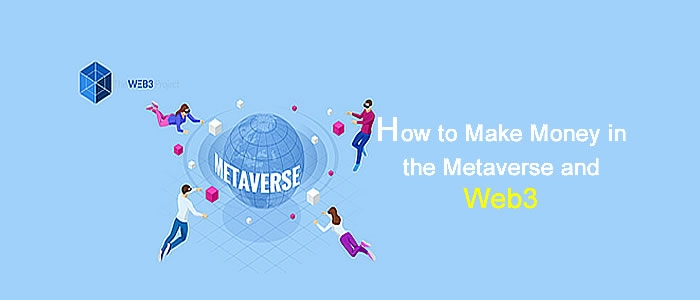
The internet is evolving. What started as simple static web pages in the early 1990s has now grown into a fully immersive, decentralized digital universe known as the Metaverse, powered by Web3 technologies. In this new frontier, people can socialize, work, trade, and even own digital assets in ways that were once only imagined in science fiction. But beyond the hype, the metaverse and Web3 offer real opportunities for individuals and businesses to make money, build brands, and create digital wealth.
Whether you’re a creative designer, a gamer, a developer, or simply an entrepreneur looking for new income streams, understanding how to earn in this emerging ecosystem can position you ahead of the next big digital wave.
1. Understanding the Metaverse and Web3
Before diving into how to make money, it’s important to understand what the metaverse and Web3 actually are. The Metaverse is a collection of interconnected 3D virtual worlds where users can interact with each other and digital environments using avatars. These worlds can be accessed through virtual reality (VR), augmented reality (AR), or even traditional desktop interfaces. Platforms such as Decentraland, The Sandbox, and Roblox are among the pioneers creating vast spaces where people buy land, host events, and trade virtual assets.
Web3, on the other hand, refers to the next generation of the internet built on blockchain technology. Unlike traditional Web2 platforms like Facebook or YouTube that are controlled by centralized corporations, Web3 gives users ownership over their data, identity, and digital assets. Through cryptocurrencies, smart contracts, and non-fungible tokens (NFTs), users can earn, spend, and invest in decentralized ways.
Together, the metaverse and Web3 create a digital economy that mirrors the real world — complete with property, currency, employment, and entrepreneurship opportunities.
2. Investing in Virtual Real Estate
One of the most lucrative ways people are making money in the metaverse is through virtual real estate. Just as in the real world, land in the metaverse is limited and can appreciate in value over time. Platforms like Decentraland, The Sandbox, and Otherside (by Yuga Labs) allow users to buy parcels of land using cryptocurrency. Owners can develop these parcels by building digital properties — such as galleries, stores, clubs, or offices — and then rent or sell them for profit.
For example, virtual real estate investors can:
- Buy and hold land, waiting for its value to appreciate.
- Develop experiences, like virtual concerts or art exhibitions, and charge for entry.
- Lease land to brands or event organizers.
- Advertise digital products or services on their property.
- Just like physical real estate, location and demand matter. Plots near high-traffic areas or popular virtual landmarks tend to hold higher value.
3. Creating and Selling NFTs
Non-Fungible Tokens (NFTs) are at the core of Web3’s creator economy. NFTs are unique digital assets that represent ownership of art, music, videos, or virtual items on the blockchain. They have revolutionized how artists, musicians, and designers monetize their work.
Ways to make money with NFTs include:
Minting and selling your creations (art, music, photography, or 3D designs) on marketplaces like OpenSea, Rarible, and Magic Eden.
Earning royalties whenever your NFT resells, thanks to smart contracts.
Flipping NFTs, buying low and selling high based on market trends.
Creating NFT collections with exclusive perks, such as membership access or physical merchandise. For creative individuals, NFTs remove middlemen and allow direct access to global audiences and collectors.
4. Play-to-Earn (P2E) Gaming
The gaming industry has merged with blockchain to create Play-to-Earn games, where players are rewarded with tokens or NFTs that can be traded for real money.
Games like Axie Infinity, Gods Unchained, and Illuvium are examples of ecosystems where players earn crypto for completing quests, breeding characters, or battling opponents. Players can also sell rare items, characters, or weapons on NFT marketplaces.
Play-to-earn is not just entertainment; it’s a new type of digital work. Some gamers in developing countries have even turned P2E games into full-time income sources. As the industry grows, more games are adopting hybrid models that blend fun, competition, and financial rewards.
5. Virtual Work and Freelancing in the Metaverse
The metaverse is creating new job opportunities. Companies and organizations are setting up virtual offices, events, and customer service centers, requiring skilled professionals to manage them.
Here are examples of metaverse jobs:
- Virtual architects and 3D designers to build environments.
- Community managers for Web3 startups.
- Developers skilled in blockchain, smart contracts, and VR/AR tools.
- Digital fashion designers creating wearable NFTs.
- Event planners hosting conferences and concerts in virtual worlds.
Freelancers can offer their services on platforms like Upwork, Fiverr, or Metaverse-specific hubs like MetaFi and Somnium Space. As companies expand into digital spaces, demand for skilled metaverse workers will continue to rise.
6. Building Decentralized Businesses and DAOs
Web3 is introducing a new organizational model called Decentralized Autonomous Organizations (DAOs) — communities governed by smart contracts and token holders rather than centralized management. Anyone can join or invest in a DAO and earn through participation, voting rights, or revenue sharing.
Entrepreneurs can:
Launch DAOs for investment, social causes, or digital projects.
Build decentralized apps (dApps) offering financial, gaming, or creative services.
Create token-based businesses, where users earn and spend native cryptocurrencies within ecosystems.For example, artists might create a DAO where members collectively fund new art projects and share profits from NFT sales. This community-driven approach aligns with the spirit of decentralization and opens up collective earning opportunities.
7. Metaverse Events and Experiences
The metaverse is redefining how people socialize and attend events. Virtual concerts, brand launches, conferences, and weddings are already happening in immersive digital worlds.
Organizers can make money by:
Selling tickets or access passes as NFTs.
Partnering with brands for virtual sponsorships.
Charging for exclusive meet-and-greets or limited-edition digital merchandise.
Streaming events to hybrid audiences in VR and real life.
For instance, global artists have hosted concerts in Fortnite and Decentraland, attracting millions of viewers — and sponsors. Businesses and creators who can deliver memorable virtual experiences will thrive in this new entertainment economy.
8. Educating and Consulting on Web3
Because Web3 is still new, there’s a massive demand for education and consulting. If you understand blockchain, crypto, or NFT technology, you can earn money by teaching others.
Ways to profit include:
Creating online courses about crypto, blockchain, or metaverse business.
Offering consulting services to brands entering the metaverse.
Hosting workshops or webinars.
Writing eBooks, newsletters, or guides on Web3 trends.
Professionals who can simplify complex concepts and help others navigate the space are already in high demand.
9. Challenges and Risks
While the potential for profit is enormous, the metaverse and Web3 also come with risks. The markets are volatile, scams are common, and regulations are still evolving. Digital assets can lose value quickly, and not every project will succeed.
It’s essential to:
- Do thorough research before investing.
- Use secure wallets and protect private keys.
- Stay updated on platform policies and regulations.
- Diversify your income streams to manage risk.
- Like any frontier economy, success in Web3 depends on knowledge, timing, and adaptability.
Conclusion: The Future Belongs to Digital Pioneers The Metaverse and Web3 represent the next major shift in how we live, work, and earn online. From virtual real estate and NFTs to play-to-earn gaming and decentralized businesses, the opportunities are vast for anyone willing to explore and learn. This is not a passing trend — it’s the foundation of a new digital economy built on ownership, creativity, and participation. Those who take the time to understand and engage with this technology now will be the digital pioneers of tomorrow, shaping a future where our physical and virtual lives blend seamlessly. The question is no longer whether money can be made in the Metaverse — but how you’ll choose to make yours.


 .jpg)




 Essential Certifications And Education For Advancing In Business
Essential Certifications And Education For Advancing In Business  Workplace Soft Skills That Make You Stand Out in the Business World
Workplace Soft Skills That Make You Stand Out in the Business World  Best Investment Opportunities To Grow Your Money
Best Investment Opportunities To Grow Your Money